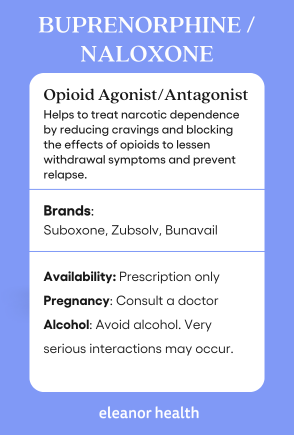
To be effective, an addiction recovery program must address the whole person. Even FDA-approved medications like Suboxone are not enough alone. A comprehensive care plan often involves medication assisted treatment, like Suboxone, to manage cravings and withdrawal symptoms, supported by counseling, medical care, peer support, and wraparound social services.
Suboxone is a brand name medicine that combines buprenorphine, an opioid agonist, and naloxone, an opioid antagonist. This means that Suboxone helps by reducing cravings while limiting the effects of other opioids.
If you or someone you know is struggling with opioid addiction, a comprehensive treatment program that includes Suboxone can help. The primary benefit is reducing cravings and withdrawal symptoms for substances like fentanyl, heroin, and prescription pain killers like oxycodone, hydrocodone, or codeine. This article will explain what Suboxone is, how it works, and important things to remember when taking it.

Suboxone is comprised of two medications: buprenorphine and naloxone. Buprenorphine is an opioid agonist, which means that it attached itself to the opioid receptors in the brain. This helps reduce cravings and withdrawal symptoms and avoid the whipsaw effects that stronger opioids, like fentanyl, produce.
Naloxone blocks opioid effects in the brain. It is commonly called by the brand name Narcan and known for reversing opioid overdoses. However, Naloxone can cause precipitated withdrawal if someone has recently used an opioid. Together, these two medications lower the risk of misuse and overdose, which has led to the widespread use of Suboxone and generic versions of the medication.
Suboxone is available in several forms:
Suboxone alone cannot cure addiction. It helps provide stabilization to the brain (neurological) and body (physiological) by helping to manage cravings, but by itself medication is much less impactful than a comprehensive addiction treatment program. To be effective, a recovery program should address the substance use disorder along with other mental and emotional health conditions, social needs, and other risk factors. A good care plan will include therapy, peer support, medical checks, and progress monitoring to compliment the medication.
This ensures that the person in recovery from addiction has the highest likelihood of staying in recovery for the long-term. A comprehensive recovery plan recognizes the obstacles that mental health challenges can bring. Depression, anxiety, bipolar disorder and other common conditions are addressed through co-occurring disorder treatment. Higher levels of care may be required for those diagnosed with paranoia, schizophrenia, and other conditions as part of a comprehensive care plan. Again, Suboxone alone won’t heal mental health conditions.
Suboxone and generic versions are prescribed as daily dose medications. However, unlike certain methadone programs, individuals on a Suboxone maintenance program can “earn” take-home doses of up to one month in many states. This is achieved through consistently achieving recovery goals and maintaining a comprehensive care plan.

A suboxone doctor will do an evaluation to determine if a buprenorphine product is a good fit for you. During this evaluation, your treatment provider will also consider your recovery goals and medical history to develop a complete treatment plan.
Suboxone may be a good treatment option for individuals who are diagnosed with an opioid addiction. Someone who is also prescribed pain management medication may do better with a methadone maintenance program instead.
Similarly, anyone with allergies to Suboxone or health concerns that may prevent them from taking Suboxone should consult with a medical provider to determine what other medication may make sense for them.
While Suboxone is an effective medication for addiction treatment, like any medication there are certain risks of side effects. It is important to understand the potential side effects of Suboxone and how to manage them.
There are some other less common side effects of Suboxone, which is why it is important to work with a licensed medical provider and only take the medication as prescribed. Certain other medications may interact with Suboxone, so please inform your care team of any other prescriptions that you are taking.
Many people prescribed Suboxone in the name brand or generic form will work with their medical team to taper down. Even someone diagnosed with fentanyl addiction can taper down to less than one milligram of Suboxone per day over the course of treatment, if medically recommended. Some people in recovery will work with their care teams to eventually stop taking Suboxone altogether, if medically recommended.
In fact, when a medical provider begins prescribing Suboxone to a new patient, they will generally start with a low dose, for example 4 milligrams, and titrate upwards to 8 milligrams, then 12, then 14, then 16 milligrams, and so forth to see how the new patient is responding. This minimizes the likelihood of severe opioid withdrawal symptoms, limits the chance of accidentally overprescribing, and allows the medical team to monitor any possible reactions.
If someone has been taking Suboxone and suddenly stops abruptly, they may experience withdrawal symptoms. For this reason, health care practitioners slowly reduce Suboxone doses to avoid the risk of withdrawal symptoms. If someone stops taking their prescribed Suboxone, withdrawals generally occur within 24 hours of the last dose, peak within 72 hours, and may last for several weeks. However, Suboxone withdrawal is relatively less intense than other opioid withdrawals and may include muscle aches, nausea, headache, or other symptoms.
Suboxone withdrawal is relatively less intense than other opioid withdrawals and includes symptoms such as:
Many individuals will taper their dose down over time. As an example, an individual diagnosed with a fentanyl addiction may start at 24 milligrams of Suboxone.
As they progress through their recovery journey and begin to see improvements through therapy, peer counseling, and other interventions, their medical team may work with them to drop to 20 milligrams, progressing down to 16, and then down to 12 milligrams, and so on. Over the course of 18 months, they may taper all the way down to 1 milligram or even 0.5 milligrams per day.
Many individuals work with their medical team to eventually taper off of Suboxone entirely, but that should be done collaboratively with the medical team.
Suboxone has a half-life of up to 48 hours, meaning that it can stay in someone’s system for up to seven days. Generally, Suboxone will appear on urine tests for up to 10 days after the last dose, saliva swabs for up to five days, and blood tests for only one or two days.
Misuse of or addiction to Suboxone is rare, but it does happen. Someone with an opioid addiction may buy Suboxone off the street, for example. Because buprenorphine has a slow onset and long duration, the risk of dependence is much lower than in full opioid agonists. Suboxone addiction or dependence is often resolved by gradually tapering down the prescribed dose as treatment progresses.
Suboxone has been used to treat opioid addiction for more than twenty years, and multiple research studies have proven that it is effective and safe during pregnancy. First and foremost, taking Suboxone as prescribed has shown to decrease opioid use by the mother, thereby decreasing the
Let your care team know as soon as you realize that you have missed a dose. Generally, if you are close to the regular dosing time, it is advised to take the daily dose when you realize that you have missed it. If you are close to your next dosing time, do NOT double-up on doses. Your medical provider will be able to provide guidance on whether or not to take the missed dose.
You should not take Suboxone if you have any of these conditions before taking Suboxone:
Some medicines and herbal supplements can interact with Suboxone and cause problems. Below is a condensed list of medications that interact with Suboxone:
Eleanor Health offers online medication-assisted treatment for opioids, alcohol, stimulants, and more. We create individualized treatment plans that include medications that fit your recovery goals as well as addiction counseling to support lasting sobriety. Fill out our online form or call us today to learn more about our addiction treatment services.
Call today to speak to one of our recovery specialists. We are ready to listen, learn and offer support without judgment.